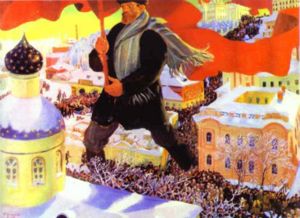October Revolution
 From Conservapedia
From Conservapedia The October Revolution or Bolshevik Revolution, led by Bolshevik leader Vladimir Lenin, took place in Russia in 1917. Lenin returned from exile when the tsarist (czarist) rule ended and by a coup against the social-democratic government of his old family friend Alexander Kerensky as he led the Bolsheviks into power.
The Congress of Soviets, in 1917, was made up of representatives of local soviets which, in turn, were supposedly elected primarily by workers and peasants in the various local districts; in reality, the Bolsheviks secured the delegates by the use of violence and intimidation. In the Congress of Soviets which met at the beginning of November 1917, the Bolshevik party had a majority. This Congress then declared itself to be "the government": that is to say, it claimed sovereignty and declared that sovereignty was no longer possessed by the Kerensky government which was based on the remnants of the old Russian Duma and had been in power since the February Revolution. The Soviet Congress then proceeded to enact the chief initial measures of the new regime and to elect an executive – the Council of Commissars.[1]
Lenin was the dictator of the Soviet state under a system of Marxism-Leninism, involving iron control of the party and the people, until his death in 1924. After his death, a power struggle between Leon Trotsky and Joseph Stalin ostracized Trotsky and brought Stalin to power. Stalin would eventually have Trotsky assassinated, and his increasing paranoia was manifested in a bloody series of purges from the mid-1930s onwards.
The October Revolution and the Bolsheviks owed a lot of their acts to the French Revolution, and as such, they planned on a line of statues commemorating various figures from the French Revolution, called monumental propaganda, to put into context their struggle. However, for various reasons, only Georges Danton and Robespierre actually were raised as statues, and one of the statues of Robespierre was destroyed due to inferior construction bases.
Patriarch Nikon of the Russian Orthodox Church did reforms to correct canonical errors to get in line with the Greek Orthodox Church, and in response was the Old Believers schism, a group that keeps dividing like Protestants do. Many Russian saints including Seraphim of Sarov and John Kronstadt warned that if Enlightenment influence continues to take advantage of this, then there will be a godless revolution. In his novel Demons, Feodor Dostoevsky also foresaw atheist revolution. Francis Bacon warned that, "The causes of atheism are: divisions in religion, if they be many; for any one main division, addeth zeal to both sides; but many divisions introduce atheism."[2] Alexander Solzhenitsyn once said that if it were not for the church schism of the 17th century, the revolution of 1917 would not have happened. Some modern historians believe that the writer was correct in the literal sense and that the Russian Old Believers played a significant role in the political cataclysms of the early 20th century.[3]
Now, it would not be fair to say that the Russian Revolution was all Jewish, though no denying that left-wing Jews were a large force (with it not helping matters that a few religious Jews such as Rabbis Harry Waton[4] and Stephen Wise[5] strongly implied that Marxism is fully in line with the precepts of Rabbinic Judaism.). In 1920, Winston Churchill wrote Zionism vs. Bolshevism in the Illustrated Sunday Herald,[6][7] in which he talks about atheist Jews being the main force. The problem is that like many followers of Secular Judaism, they never cared for Jewish interests and many Jews were victims as well. The Bolsheviks did attack synagogues just as much as they did churches. When asked to identify himself as Russian or Jewish, Trotsky said that he is neither.[8] One famous instance of this was when the Chief Rabbi of Russia, Jacob Maze, attempted to request that Trotsky use his influence in the Red Army to have it protect the various Jews from Lenin's Pogroms, only for Trotsky to state that he was a Communist and didn't view himself as Jewish, causing Maze to reply with "Trotsky makes the revolutions, and the Bronsteins pay the bills.", referencing Trotsky's birth name of Lev Bronstein. Most websites containing the transcript of Churchill's article are controlled by those engaging in Holocaust denial and therefore should be avoided. The same sites also neglect to note that Churchill mentioned that Trotsky's Jewish heritage was the only reason he wasn't made the Dictator of Russia over Lenin despite his massive contributions to Communism, including and not limited to his creation of the Red Army.
Calendar confusion[edit]
- The confusion about the naming of the October or November Revolution is because at the time the Russians still used the Julian calendar, which meant that it was around a month behind the more modern states who used the Gregorian calendar, so for the other states the revolution occurred in November, but to the Russians it occurred in October.
Further notes[edit]
- Bolshevik, in Russian, means majority, while Menshevik means minority.
References[edit]
- Pipes, Richard. A Concise History of the Russian Revolution (1996), by a leading conservative scholar excerpt and text search
- Sutton, Anthony C. Wall Street and the Bolshevik Revolution (1974), documents records from the US State Department showing how the United States backed the October Revolution
Notes[edit]
- ↑ James Burnham, The Managerial Revolution, Indiana University Press, Bloomingham 1966.
- ↑ http://www.bartleby.com/3/1/16.html
- ↑ https://tsarnicholas.org/2019/03/04/how-old-believers-suffered-from-the-overthrow-of-nicholas-ii/
- ↑ A Program for the Jews and Humanity, Rabbi Harry Waton, p. 138; 143-144; 148
- ↑ The American Bulletin, May 5, 1935
- ↑ https://www.scribd.com/document/197927718/Churchill-Zionism-Versus-Bolshevism
- ↑ https://www.scribd.com/document/401493182/Winston-Churchill-zionism-Versus-Bolshevism-Illustrated-Sunday-Herald-1920
- ↑ http://www.covenant.idc.ac.il/en/vol1/issue3/jews-communists-and-jewish-communists.html
Categories: [Soviet Union] [Russian History] [Communism]
↧ Download as ZWI file | Last modified: 02/18/2023 04:51:29 | 13 views
☰ Source: https://www.conservapedia.com/October_Revolution | License: CC BY-SA 3.0
 ZWI signed:
ZWI signed:

 KSF
KSF